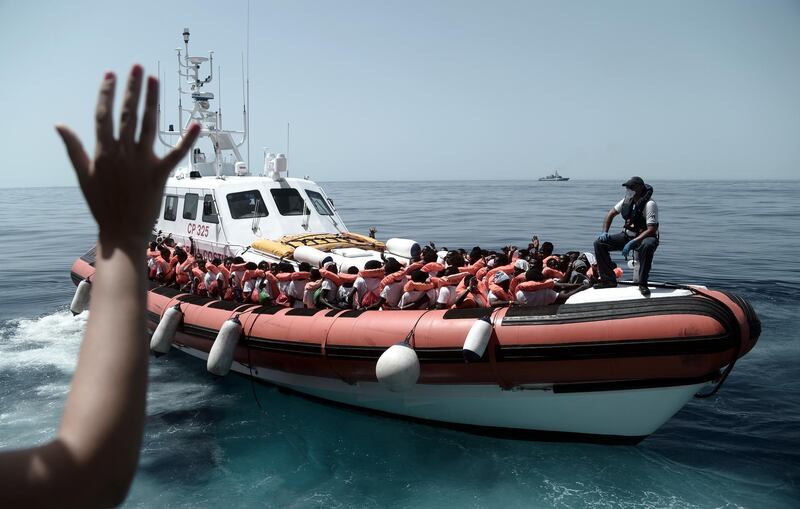Medicines Sans Frontiere appealed Tuesday to the Italian government to allow migrants stranded at sea on rescue ship it operates in the Mediterranean to be allowed to disembark temporarily in Italy as governments around Europe squabbled over their fate. Emmanuel Macron, the French president, weighed into the increasingly bitter row with an attack on Rome after the government banned the ship from entering the country’s ports.
"In cases of distress, those with the nearest coastline have a responsibility to respond,” Mr Macron’s spokesman said. "There is a degree of cynicism and irresponsibility in the Italian government's behaviour."
The intervention came a day after Spain’s new left-wing government offered to take in the more than 600 migrants and refugees on the Aquarius. It has bobbed uncertainly in the waters near the southern coast of Italy since Saturday. Its exhausted occupants were picked up from half a dozen boats adrift in the Mediterranean and now swelter under the blazing sun on a boat dependent on supplies from the coastguard
MSF welcomed the Spanish offer but has urged Italy to reconsider its ban because the four-day journey to Spain “would mean already exhausted people rescued at sea would have to endure four more days exposed to the elements on the deck, in an overcrowded boat already well over maximum capacity and in deteriorating weather conditions”.
“The better option”, MSF said, “would be to disembark the rescued people in the nearest port, after which they can be transferred to Spain”.
Previous Italian governments backed down from efforts to stop ships landing but Matteo Salvini, the hardline interior minister, has refused to budge.
“Rescuing lives is a duty, transforming Italy into an enormous refugee camp is not”, he wrote in a post published on Facebook the same day. “Italy has stopped bowing its head and obeying,” he said.
Mr Salvini’s defiance, directed at the European Union and Italy’s neighbours – particularly Malta, which is a short distance from Italy – has been welcomed by Luigi Di Maio, the leader of the anti-establishment Five Star Movement which, along with the interior minister’s League party, leads the coalition governing the country.
_______________________________
Read more:
[ Closed ports represent Italian populists' isolation over outreach as migrant aid ship still in limbo ]
[ Spain to accept migrant ship that Italy and Malta refused ]
_______________________________
The pledge to crackdown on immigration was the central theme of Mr Salvini’s campaign in the run up to the elections held in March. Italy’s burgeoning migrant population – more than half a million have arrived from Africa alone since 2014 – has caused such an uproar that the centre-left Democratic Party appealed to fellow European nations and the EU to help stem the tide of incomers. Few were willing to help, however, and the subject became rife for exploitation by Mr Salvini, who cast himself in the role of Italy’s saviour while leading a formerly separatist party that sought until recently to cleave Italy. Mr Macron’s decision to upbraid the Italian government has been welcomed by the latter as proof that it is standing up for Italians. Mr Di Maio, the leader of the Five Star Movement, responded by asking the French to open their ports so that Italy could “transfer a few of the people to France”.
Pedro Sanchez, a pro-European Socialist, is the antithesis of Mr Salvini. By inviting the Aquarius to dock on Spain’s shores, his government said, Madrid is fulfilling its “obligation to avoid a human catastrophe” and reaffirming its commitment to “international law”. By volunteering to take in migrants and refugees turned away by Italy, Mr Sanchez is signalling that Spain has not succumbed to the anti-immigrant mood prevalent in the neighbourhood.
But can this resolve be sustained? Despite an economy that has registered consistent growth over the past three years, Spain still has one of the worst unemployment rates in Europe; last year, almost 40 per cent of the nation’s under 25s eligible for work were without a job. Mr Sanchez’s ability to fix unemployment is undermined by the rickety nature of his premiership, dependent on a mutually distrustful coalition of nationalists and left-wingers brought together by their aversion to his predecessor. Mr Sanchez is on much shakier ground compared to Angela Merkel, Germany’s long-serving Chancellor, who barely survived the backlash generated by her decision to admit a large number of refugees into Germany.
To be sure, Mr Sanchez has granted entry to a very modest number of migrants. But what happens when the next rescue ship arrives? Will he be able to walk away from the precedent he has set with Aquarius? Far-right political parties have thus far been a marginal force in Spain’s politics – as they were in much of Europe a decade ago. Will Mr Sanchez’s liberalism, ironically, breed the conditions for the rise of illiberal politicians? With notable exceptions, the story of Europe over the past decade is that nations that saw themselves as exceptional and immune to the currents of populism are now besieged by democratically elected populists.







